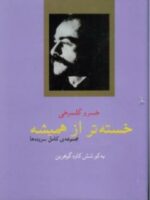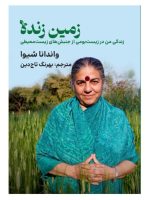
Khosrow Golsorkhi was a journalist, poet, writer and the editor-in-chief of the Kayhan newspaper in the late 1960s. The majority of his work was in poetry and literary criticism of other contemporary intellectuals and academics.
In the mid-1970s, a number of guerrilla movements formed in Iran, with members of these movements sometimes resorting to “armed struggle” against Muhammad Reza Shah’s government. One of these movements, the Organization of Iranian People’s Fedai Guerrillas, attracted the attention and membership of several revolutionaries and extremists. A second prominent group, not directly affiliated with the People’s Fedai Guerillas, harboured sympathies for it; meanwhile, it was centred around two main figures, Khosrow Golsorkhi and the communist and poet Keramatollah Daneshian.
This group consisted of 12 individuals, all of whom were arrested in 1972, i.e. seven years before the 1979 Islamic Revolution, on charges of “conspiracy to cause harm to the royal family.” The group’s trial was held in a military court in early 1974 and was broadcast live on Iranian television. A number of the group’s members confessed their apparent guilt and requested that the Shah of Iran pardon them for their actions. However, five people, including Khosrow Golsorkhi, Keramatollah Daneshian, Tayfur Batahi, Abbas Ali Samakar, and Reza Allamehzadeh, refused to confess even after being tortured. They were sentenced to death.
According to a number of historians and some of Golsorkhi’s colleagues, it was the confession of Shokooh Mirzadegi (also known as Shokooh Farhang), one of Golsorkhi’s colleagues at Kayhan, that led to Golsorkhi’s arrest and the subsequent accusation of a plot to assassinate the Crown Prince of Iran.
On February 22, 1979, Reza Allamehzadeh, a film director and one of the twelve individuals who was arrested as part of the group, wrote in issue 10,644 of Kayhan, saying: “After the arrest, Shokooh Farhang, who was one of our associates, disclosed information about Khosrow Golsorkhi’s connection to the plot [to kidnap and assassinate the Crown Prince of Iran] from over two years ago. Shokooh Farhang even said in court that because she had identified the members of the group [for the court], she should be exempt from prosecution. SAVAK [the National Organization for Security and Intelligence, the Shah’s secret police and intelligence service] didn’t have any knowledge of the plot. The legal case was introduced by Shokooh Farhang, Golsorkhi and several others were drawn into our case, and after six months in prison, they were accused also of plotting to assassinate the Shah.”
In 2013, Atefeh Gorgin, the wife of Khosrow Golskhari, spoke with The Majalla magazine in an interview in Paris, explaining that; “In 1971, all three of us, Khosrow Golsorkhi, together with Shokooh Mirzadegi and I, worked for Kayhan newspaper. We formed a small group with a few others so that we could try to prepare a plot to assassinate [the Shah] Mohammad Reza Pahlavi. Through her relationship with the Shah’s personal pilot, Shokooh Mirzadegi was aware of the Shah’s travel schedule and where he was staying and she told the group about the information she gathered on this subject. Different initial plans were hatched, but since none of them were practical, we ruled out the idea of assassinating the Shah.”
According to Golsorkhi’s wife, the plot to assassinate the Shah had been dropped before Golsorkhi was arrested. Despite this, Khosrow Golsorkhi and the other members of the group were arrested and convicted of plotting to assassinate the Shah.
In court, Golsorkhi and Daneshian denounced the regime and defended the ideals of Marxism and of a popular revolution.
Eventually, Batahi, Samakar, and Allamehzadeh, who all apologised for their actions and requested a pardon from the Shah during the court hearings, were given prison sentences ranging from 3 to 5 years. However, Khosrow Golsorkhi and Keramatollah Daneshian refused to apologize to the Shah and were sentenced to death. They were executed on February 18, 1974 in Tehran.
The courage that Golsorkhi displayed while defending himself in court, and at his eventual execution, brought him praise and popularity in Iranian society. In his defense statements in court, Golsorkhi said: “As a Marxist-Leninist, I first sought social justice within the school of Islam and from there I then came to socialism.”
In another of his defenses, he compared his cause to that of the Imam Hussein, saying: “The life of Mawla [an Arabic designation intended to show reverence] Hussein is an example for our current life in which our lives are laid bare and we are being tried in this court for the deprived people of our homeland. He was in the minority; Yazid [of the Sunni faction] had a court, an army, a government and power. He [Hussein] took a stand and was martyred. Although Yazid occupied a corner of history, what was repeated in the passage of history was the path of Mawla Hussein and his resistance, not the rule of Yazid. What the people have repeated and are doing is that same path of Mawla Hussein.”
“I do not want an appeal. I want to die. I have no rights in this society. I do not want an appeal and I want to die.” These were the last words that Khosrow Golsorkhi, also known as Abdolhossein Golsorkhi, said as part of the hearings in the military court. When an officer urged him to appeal to have his death sentence overturned, Golsorkhi said without hesitation that he did not want an appeal and preferred death.
Khosrow Golsorkhi published most of his works under a pseudonym. His works included Tired More Than Ever, O My Country, The Politics of Art, The Politics of Poetry, Nima and Khaki Truth and Literature of the Masses. Golsorkhi also translated A Dying Colonialism by Frantz Fanon.







